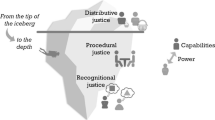Abstract
Ecosystems provide a wide range of services to society. Some forms of use affect the quality of the ecosystem, reducing its value for other users. This leads to a conflict of interest that is often settled through political processes, resulting in some form of regulation. We link theory on ecosystem response to theories from the socioeconomic branches of science to analyze the mechanisms behind two widespread problems associated with such political solutions. First, they often represent a compromise rather than an integrative solution. We demonstrate that, particularly in sensitive ecosystems, integrative solutions yield a higher average social utility and imply a higher ecosystem quality. Integrative solutions require insight into ecosystems responses to different forms of use and a complete overview of ecosystem services to society. Second, there is a systematic bias away from optimal shared use toward activities that are detrimental to ecosystem quality. This bias arises from the fact that utilities depending on ecosystem quality are often shared by large diffuse groups, whereas pollution and harvesting activities can usually be traced to relatively small and well-organized groups. Theory and data indicate that this type of concentrated group is systematically better at mustering political power than large groups, which find it difficult to realize collective action due to what is known in game theory as “free-rider problems.”
Our analysis suggests that the following three key ingredients are needed to correct the problems of bias and compromise: (a) clear insight into ecosystem dynamic responses to human use, (b) a broad inventory of credible measurements of ecosystem utilities, (c) avoidance of bias due to differences in the organizational power of groups of stakeholders. We argue that good ecosystem models, institutionalized ecosystem valuation, and innovative tax-setting schedules are essential to achieving a socially fair and sustainable use of ecosystems by societies. In addition, we highlight the fact that many environmental problems remain unresolved for a long time and briefly identify the social mechanisms responsible for this delay.
Similar content being viewed by others
Author information
Authors and Affiliations
Additional information
Received 10 November 1999; accepted 28 April 2000.
Rights and permissions
About this article
Cite this article
Scheffer, M., Brock, W. & Westley, F. Socioeconomic Mechanisms Preventing Optimum Use of Ecosystem Services: An Interdisciplinary Theoretical Analysis. Ecosystems 3, 451–471 (2000). https://doi.org/10.1007/s100210000040
Issue Date:
DOI: https://doi.org/10.1007/s100210000040




